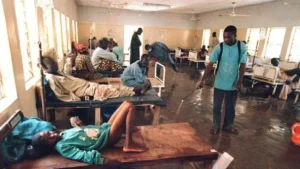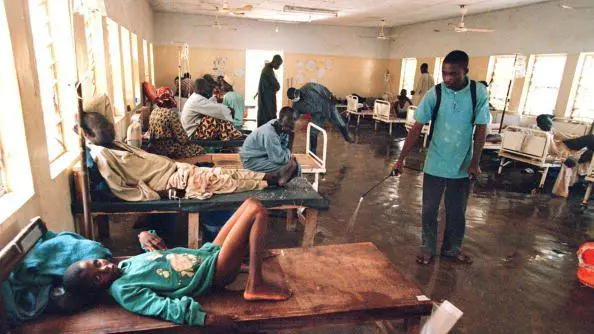By Abujah Racheal, News Agency of Nigeria (NAN)
Meningitis continues to pose a significant threat to public health in Nigeria, particularly in the northern regions, where environmental and socioeconomic factors reinforce the risk of outbreaks.
According to the Nigeria Centre for Disease Control and Prevention (NCDC), Nigeria has recorded 4,915 suspected cases of cerebrospinal meningitis in 24 states in 2023 and 2024 seasons, resulting in 361 deaths, representing a fatality rate of 7.3 per cent.
Dr Jide Idris, Director-General, NCDC, says that 44 per cent of the 859 samples tested positive, with Neisseria meningitides serogroup C accounting for 90 per cent of confirmed cases.
Idris further said that males aged five to 15 years were most affected, with Yobe, Bauchi, Jigawa, Katsina, and Gombe states contributing 93 per cent of all reported cases.
The current season has seen a 157 per cent increase in cases compared to the previous year.
Alarmingly, the majority of cases involved children aged one to 15 years, highlighting the vulnerability of young people to this disease.
Nigeria, like many of its neighbours in Africa’s “Meningitis Belt,” has long battled recurrent meningitis outbreaks, especially during the dry season.
Experts say the highest concentrations of cases were seen in northern states where overcrowded living conditions, poor access to healthcare, and harsh environmental conditions contribute to the disease’s spread.
For instance, the 2023–2024 outbreak of Neisseria meningitis serogroup C led to 1,742 suspected meningitis cases and 153 deaths in seven northern states—including Adamawa, Bauchi, Gombe, Jigawa, Katsina, Yobe, and Zamfara—between October 2023 and March 2024.
These alarming statistics underscore the urgency of Nigeria’s battle against the didease.
Among the affected families, the story of Mrs Maryam Danjuma and her 12-year-old daughter, who came to the Federal Capital Territory (FCT) from Gombe State, is particularly poignant.
Danjuma, while speaking with the News Agency of Nigeria (NAN) in the Damagaza community of Lokogoma District, FCT, recounted her daughter’s battle with meningitis, which began with a high fever and severe headache.
“We thought it was just a common illness. By the time we sought medical help, it was too late. My daughter spent weeks in the hospital here in Abuja, fighting for her life”, she told NAN.
Her story is one of resilience but also indicates the harsh realities faced by many families in Nigeria.
The emotional and financial toll of such illnesses can be overwhelming, often leaving families in debt and struggling to cope with the aftermath.
In Bauchi State, Mallam Musa Mohammed, a health worker, has witnessed firsthand the devastation meningitis can bring to communities.
“Every outbreak brings fear and uncertainty. Many parents hesitate to seek treatment until it’s too late,” he explained.
Mohammed explained the importance of early intervention and vaccination, urging families to understand the risks associated with meningitis.
Recent events have paved the way for a more hopeful future.
In March 2024, Nigeria became the first country to introduce the Men5CV multivalent meningitis vaccine, a breakthrough that offers protection against the five leading strains of Neisseria meningitis, A, C, W, Y, and X, with a single injection.
This development marked a monumental step forward in Nigeria’s fight against meningitis.
According to World Health Organisation (WHO), the vaccine, developed over 13 years through global collaborations and multilaterally financing, is expected to play a crucial role in eliminating meningitis across the entire Meningitis Belt.
This aligns with Nigeria’s commitment to improving public health, particularly in the wake of a 50 per cent increase in reported cases across Africa between 2022 and 2023.
Prof. Ali Pate, Nigeria’s Minister of Health and Social Welfare, praised the vaccine.
“The Men5CV vaccine is a vital tool that will empower our healthcare workers to prevent outbreaks and put Nigeria on the path to eliminating meningitis.
“We are committed to ensuring that this life-saving vaccine reaches every corner of the country, especially in the most vulnerable regions”, he said.
The WHO has lauded the vaccine, with its Director-General, Dr Tedros Adhanom Ghebreyesus, noting that: “the rollout of the Men5CV vaccine is a milestone in our global effort to eliminate meningitis by 2030.
“Nigeria’s leadership in this endeavour serves as a model for other nations grappling with the health burden of meningitis.”
The WHO planned to deliver one million doses of the Men5CV vaccine in Nigeria, targeting individuals aged one to 29—a group particularly vulnerable to the disease.
Public health experts underlined that the persistence of meningitis outbreaks in the country was largely due to environmental factors prevalent in northern states.
Dry, dusty harmattan winds create conditions that aggravate respiratory illnesses and trigger the spread of airborne pathogens like Neisseria meningitis.
Overcrowded living conditions, poor sanitation, and limited access to healthcare further exacerbate the situation.
Dr Solomon Chollom, a virologist and public health expert, emphasised the need for an integrated approach that tackles both environmental and social determinants of health.
“While vaccines are crucial, controlling meningitis in Nigeria requires improving access to clean water, reducing overcrowding, and educating communities on hygiene”, Chollom said.
Dr Biodun Ogunniyi, Assistant Director, NCDC, stressed the importance of maintaining momentum in vaccination campaigns, particularly in hard-to-reach areas.
“Timely vaccination can prevent outbreaks before they spiral out of control,” Ogunniyi said, an Epidemiologist..
Experts said that enhanced surveillance systems were critical in managing meningitis outbreaks, allowing for quicker containment and treatment.
Prof. Oyewale Tomori, a virologist, said that innovation like mobile health platforms could revolutionise how Nigeria tracks and responds to outbreaks.
Tomori said while vaccines were the cornerstone of meningitis prevention and access to timely treatment remains crucial for those who contract the disease.
Dr Ishaku Akyala, an Associate Professor of Infectious Diseases at Nasarawa State University, Keffi, called for increased investment in strengthening primary healthcare system.
This is particularly in northern Nigeria, with a view to ensuring that health workers were adequately equipped to diagnose and treat meningitis effectively.
“Public education is another critical pillar in the fight against meningitis,” Akyala remarked.
According to him, many Nigerians, particularly in rural areas, are not fully aware of the symptoms or the severity of the disease, leading to delays in seeking medical help.
He explained the need for community-based campaigns to educate Nigerians about the importance of vaccination, hygiene, and early treatment.
Dr Fatima Kyari, a community health specialist, said that traditional and religious leaders can play a pivotal role in raising awareness about meningitis and vaccination efforts.
“Engaging these leaders will be key to overcoming vaccine hesitancy and ensuring community buy-in,” Kyari said.
She said that long-term efforts to control meningitis in the country must also address the underlying environmental conditions that facilitate outbreaks.
“Improving living conditions in overcrowded areas, ensuring access to clean water and sanitation, and promoting better respiratory health practices can all help reduce the spread of meningitis,” she said.
Nigeria’s launch of the Men5CV vaccine is not only a victory for the country but also a significant milestone in global public health.
By embracing this innovative vaccine, Nigeria sets a precedent for other nations grappling with the health burden of meningitis.
Mrs Chika Offor, CEO, Vaccine Network for Disease Control (VNDC), described “Nigeria’s vaccine rollout is a powerful example of how countries can lead the charge against deadly diseases like meningitis.
“This is a monumental step, not just for Nigeria, but for public health worldwide.”
“As we marked World Meningitis Day on October 5, we should build on this remarkable success by following the WHO roadmap that outlines what needs to be done to eliminate meningitis as a public health threat by 2030,” Offor said.
She said that achieving this required collective action and resource dedication to preventing new cases and outbreaks.
“This includes deploying state-of-the-art vaccines, investing in diagnosis, treatment, and surveillance, and supporting those who survive meningitis.
“Doing so by 2030 would prevent nearly a million deaths and 800,000 people from living with the devastating consequences of infection,” she said.
The road ahead may still be challenging, but with continued commitment from the Nigerian government, international partners, and communities, there is a clear path forward to defeating meningitis once and for all.
As Nigeria consolidates its healthcare infrastructure and continues its vaccination efforts, the goal of eliminating meningitis by 2030 seems more achievable than ever. (NANFeatures)
**If used please credit the writer and News Agency of Nigeria.

